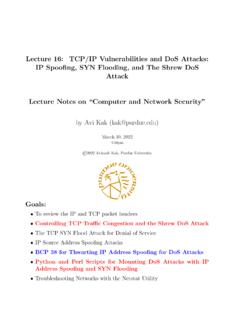Transcription of The Role of Information Technology in the Business Sector
1 International Journal of Science and Research (IJSR) ISSN (Online): 2319-7064 Impact Factor (2012): Volume 3 Issue 12, December 2014 Licensed Under Creative Commons Attribution CC BY The Role of Information Technology in the Business Sector Prof. Krume Nikoloski PhD 1 Faculty of Economics at University "Goce Delcev" Stip, Republic of Macedonia Abstract: The Business Sector produces products and services for profit. Information Technology describes any Technology used to create, process and disseminate Information that is critical to Business performance. Information Technology is important to the Business Sector as a management tool to optimize the processing of Information to produce goods and services for profit. No matter the size of your enterprise, Technology has both tangible and intangible benefits that will help you make money and produce the results your customers demand.
2 Technological infrastructure affects the culture, efficiency and relationships of a Business . It also affects the security of confidential Information and trade advantages. The Information revolution is sweeping through economy. No company can escape its effects. Dramatic reductions in the cost of obtaining, processing, and transmitting Information are changing the way we do Business . Keywords: Business Sector , Information Technology , competitive advantage, Business relationships 1. Introduction With Information Technology (IT) going mobile, thanks to the deployment of faster and more reliable broadband networks, we are experiencing yet another Technology driven transition. Technology (-based) businesses can be referred to as businesses that engage in Technology related products, processes and services.
3 They may be low-, medium- or high- Technology . One area of the economy which has seen significant growth is that focused on new Technology -based products and services and the high- Technology sectors are perceived as major sources of future economic prosperity and employment growth. However, IT includes the management Information systems (computers, hardware, software, networks) used to automate and support Business tasks and decision-making. IT is used to automate simple, routine tasks such as word processing and advanced processes such as production, scheduling and logistics. In this manner, Information Technology enables businesses to operate efficiently and profitably. Technological advances in the past few decades have greatly increased the competitive nature of the economic Business world.
4 Companies have used software, computers and the Internet to transform their businesses from local places of Business to national and global market competitors. Many companies have responded to these changes by automating their Business processes and capturing industry-related Information and using it to their advantage. Technology has also forced businesses to remain flexible, adapting their operations to newer and better technological advances. Business owners once had very few tools at their disposal: little more than a basic adding machine and paper records. Today's Business owners can complete their duties much more effectively than their predecessors with an array of technological tools at their disposal. By using these tech-tools, companies and employees enjoy a number of Business -related benefits.
5 We know that the Business Sector produces products and services for profit. Information Technology describes any Technology used to create, process and disseminate Information that is critical to Business performance. Information Technology is important to the Business Sector as a management tool to optimize the processing of Information to produce goods and services for profit. Automation improvements achieved by deploying Information Technology usually decrease the number of personnel required. Economies of scale gained through the deployment of Information Technology reduce the overall cost for businesses to produce products and services. This has an overwhelmingly positive effect on the financial goals of a Business .
6 Quality assurance entails systematic testing to ensure that a Business is producing quality goods and services for its customers. Rigorous quality standards help Business outputs meet the required specifications. Quality assurance can be used within processes such as marketing, customer support and accounting, as well as product testing. The effective and efficient processing of Information related to achieving quality assurance goals is key to the delivery of quality goods and services to Business customers. Investments in Information Technology can help make a firm s operational processes substantially more efficient, and its managerial processes much more effective. By making such improvements to its Business processes a firm may be able to: 1.
7 Dramatically cut costs 2. Improve the quality and customer service 3. Develop innovative products for new markets Investments in Information systems Technology can result in the development of new products, services, and processes. This can: 1. Create new Business opportunities 2. Enable a firm to enter new markets 3. Enable a firm to enter into new market segments of existing markets. Paper ID: SUB14320303 International Journal of Science and Research (IJSR) ISSN (Online): 2319-7064 Impact Factor (2012): Volume 3 Issue 12, December 2014 Licensed Under Creative Commons Attribution CC BY About strategic, competitive advantage plays a fundamental role in the success of a given Business within its Sector . Information Technology has become fundamental to acquiring competitive advantage. The combination of process improvements, cost reductions, communications and quality assurance all contribute to the competitive advantage of a Business unit.
8 However, the constant identification and analysis of new risks and opportunities are critical to the ongoing success of a Business . Evolving Internet aggregation technologies, including social networks, blogs and subscription databases, are becoming important tools needed to achieve and maintain advantages within the Business Sector . The transfer of Information is a significant impact of Information Technology in Business . Companies gather Information from both internal and external sources with more efficiently than in previous years. Email is now a common form of Business communication that results in near-instant messages that deliver important Information . 2. The Role of Information Technology Importance of Information Technology in Business relationships The social interaction of a Business relationship can be discussed in terms of how often people from the companies meet, or how well the parties know each other.
9 It is argued that depending on the extent of the use of Information Technology for different exchanges, the impact on the social interaction patterns that are carried out without Information Technology may be influenced. One argument that could be raised in the theorizing on the effect of use of Information Technology in Business relationships is that the number of meetings, or need for meetings will decrease, as the use of the Technology handles a great deal of Information exchanges, replaces some of the personal exchange of Information . The question is if the need for personal meetings decreases when the levels of Information Technology use increase. That would suggest increased efficiency of meetings, as the use of Information Technology then replaces other means of interaction for some types of exchanges.
10 On the other hand, the use of Information Technology may require additional meetings, if the Technology is difficult use or the purpose of its employment is another than making the Information exchange more efficient by decreasing the need for meetings. The reasons why the use of Information Technology in Business relationships would decrease or increase the need for personal meetings can only be speculated on. The social interaction of a Business relationship can be discussed in terms of how often people from the companies meet, or how well the parties know each other. It is argued that depending on the extent of the use of Information Technology for different exchanges, the impact on the social interaction patterns that are carried out without Information Technology may be influenced.














